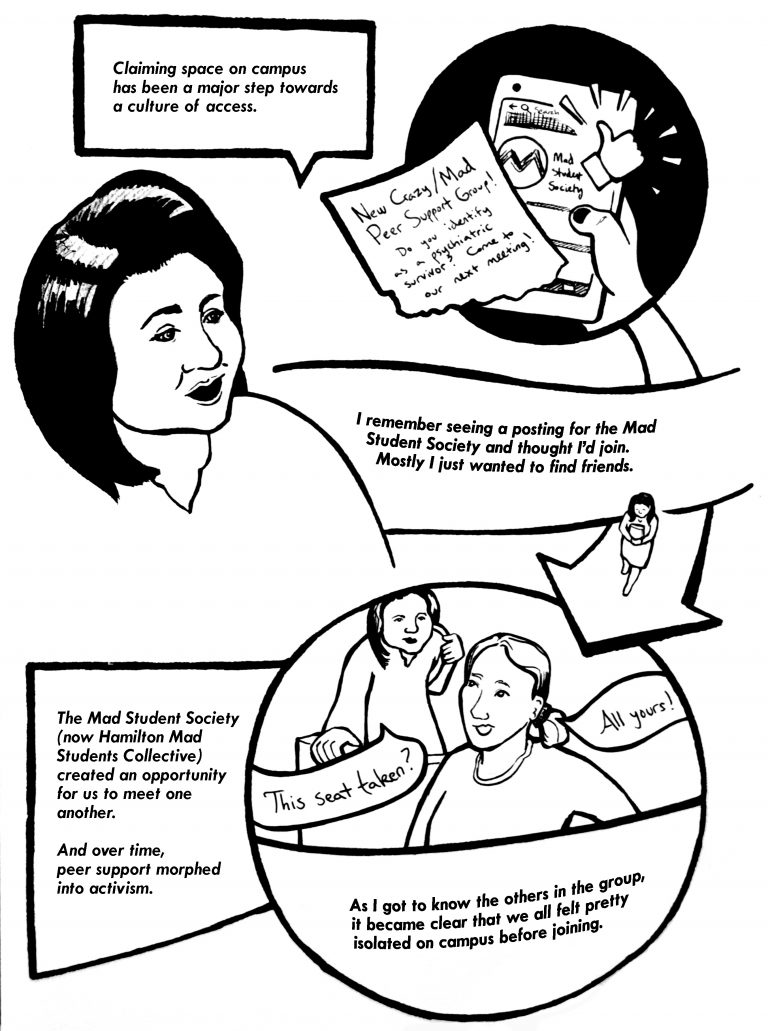9 Teaching and Learning: Accessibility and Disability Inclusion in Research, Instruction and Course-Level Enhancements
 Not ‘everything’s a learning experience’: Racialized, Indigenous, 2SLGBTQ, and Disabled Students in Social Work Field Placements
Not ‘everything’s a learning experience’: Racialized, Indigenous, 2SLGBTQ, and Disabled Students in Social Work Field Placements
This paper critically explores the implicit and explicit message that ‘everything’s a learning experience’ when social work students engage in practice / community contexts as part of their professional training. It does so by reporting findings from focus groups, interviews, and an online survey about the field education experiences of racialized, Indigenous, 2SLGBTQ, and disabled social work students.
According to these students, messaging that ‘everything’s a learning experience’ demands their adaptation to issues arising in placement as ‘opportunities for learning’, rather than recognizing how, at times, this ‘learning’ can entail corrosive instances of inequity, harm, neglect, and / or the additional demands of diversity, or emotion work. We show how common placement discourses and expectations—intersecting with placement shortages—are having detrimental effects on students and encourage specific attention to how students from equity-seeking groups are affected. We offer an analysis of the ‘crisis in field’ from the perspectives of these racialized, Indigenous, 2SLGBTQ, and disabled students.
Contributors: Alise de Bie, Janice Chaplin, Jennie Vengris, Eminet Dagnachew, and Randy Jackson (School of Social Work)
Orientations to Teaching More Accessibly in Postsecondary Education: Mandated, Right, Pedagogically Effective, Nice, and/or Profitable?
This paper describes five orientations informing the efforts of postsecondary educators to teach more accessibly, including commitments to accessibility as the mandated, right, pedagogically effective, nice, and / or profitable thing to do. These orientations emerged from focus groups and interviews with instructors and teaching assistants at McMaster University. By attending to these underlying orientations, we can grapple with important, but often unexamined, complexities, such as messages we may be inadvertently endorsing, and contradictions between intentions and potential outcomes, and their ramifications.
We encourage support for educators to reflect on the limitations and complications of their orientations, and associated efforts to advance accessibility, as well as cross-pollination with other areas of critical scholarship beyond that focusing on Universal Design and accessibility-specific principles.
Contributors: Alise de Bie, Beth Marquis, Megan Suttie, Olivia Watkin-McClurg, and Cherie Woolmer (MacPherson Institute)
Engaging Trauma-And-Violence Informed Pedagogical Practices for Inclusive Education at McMaster
The experience of trauma can interfere with learning and can be particularly problematic for those from equity-seeking groups. Engaging trauma-and-violence informed pedagogical practices can mitigate the effects of trauma on learning, advance accessibility and inclusivity, and lead to better learning outcomes. The overarching goal of our project is to identify and implement universally designed trauma-and-violence-informed practices within McMaster’s MSc Occupational Therapy program, then disseminate findings to contribute to excellence in inclusive education at McMaster.
To achieve this goal, we will first conduct an integrative review of the literature and the results will inform the development of an implementation plan. Trauma-and-violence-informed practices will then be implemented and studied. It is anticipated that findings will be implemented and sustained in several ways including potential changes to the course syllabus, as well as by informing the Universal Design for Learning strategy already active in the MSc Occupational Therapy program. Results will also be disseminated within the Faculty of Health Sciences and beyond.
Contributors: Dr. Sandra VanderKaay, Dr. Susan Jack, Dr. Michelle Phoenix, and Dr. Brenda Vrkljan (School of Rehabilitation Science)
Teaching With Madness Autobiographies in Postsecondary Education
This paper presents a critical interpretive synthesis of 53 articles describing the pedagogical use of madness / ‘mental illness’ autobiographical narratives in postsecondary education. Focusing on instructor intentions and representations of student learning outcomes, findings indicate that narratives are most used as ‘learning material’ to engage students in active learning, cultivate students’ empathy, complement dominant academic / professional knowledges, illustrate abstract concepts, and provide ‘real’-life connections to course content. This paper contributes to a conversation across the intellectual traditions of Mad studies, medical humanities, educational research, stigma reduction, and service user involvement to interrogate pedagogical uses of autobiographical narratives that remain in uncritical educational terms rather than as a matter of justice for Mad communities. While teaching with narratives will not inevitably result in social justice outcomes, thoughtful engagement with the ethical and epistemological considerations raised throughout this review may increase this possibility by shifting when, why, and how we teach with autobiography.
Contributors: Alise de Bie (MacPherson Institute)
DeGroote School of Business 1GR0: Student Experience and Development
In Fall 2020, the DeGroote School of Business launched the first co-curricular course in a series to support students’ development of critical thinking, collaboration, communication, and self-management skills.
1GR0: Student Experience and Development is a pass / fail and highly experiential course, and it is delivered with accessibility and inclusivity in mind. Accessible course components include:
Designing an Accessible Learning Environment
- Accessibility is included as a criterion when evaluating the adoption of digital technology by instructors for teaching and learning purposes.
- MS Teams enables tutoring and communication amongst students as it includes features such as live captioning, language translation, customization of reading and viewing experience, read aloud options, management of notifications, and compatibility with assistive technology.
- Zoom enables accessible lecturing with the ability for users to customize closed captions, font sizes in chats, and to enable screen reader alerts.
Creating and Selecting Accessible Course Content
- The course is designed applying the principles of universal design to curriculum development, instruction, and assessment.
- The content is developed applying principles of universal design for learning to provide clear instructions, simple language, connect, and highlight key information, and relate content to course learning outcomes and objectives.
- Recordings of live classes are hosted in MacVideo so students can access alternative text options such as captions and transcripts.
Fostering Welcoming and Engaging Social Interactions
- Lectures and tutorials support principles of inclusive teaching such as establishing a climate of belonging, setting explicit expectations, and recognizing diversity.
- The experiential activity in the course (The 24-Hour Case Challenge) is a safe environment for students to apply what they learn in the Commerce program.
- Through the course, the knowledge base is established, group work is supported, and evaluation is focused on development rather than mastery of skills.
- The teaching team is trained to respond quickly to accessibility requests and barriers, such as student mental health issues, lack of digital literacy skills, group work challenges, and timezone constraints.
Contributors: Dr. Sue McCracken and Nidia Cerna (DeGroote Dean’s Office / DeGroote Student Experience)
MacPherson Institute: Integrating Accessibility, Equity, and Inclusion into Quality Assurance, Course-Level Supports, and TA Training
In the area of the Institutional Quality Assurance Program (IQAP), the MacPherson institute (MI) expanded existing supports on accessibility in self-studies to include Equity, Diversity, Inclusion, and Accessibility (EDIA). In partnership with the Equity and Inclusion Office (EIO), MI launched the Inclusion, Diversity, Equity, Accessibility, and Sustainability (IDEAS) grants program, renewing these grants for an additional year, while also supporting student partner projects focused on EDIA work. Finally, MI partnered across the institution to launch mandatory, paid TA training which includes workshops on accessibility and disability inclusion topics led in partnership with the Equity and Inclusion Office.
Contributors: The MacPherson Institute
Faculty Liaison for Accommodations within the Faculty of Social Sciences
The Faculty of Social Sciences created a new role in 2020 – Faculty Liaison for Accommodations (FLA). The role supports both instructors and students, ensuring that accommodation implementation strategies maintain pedagogical design while at the same time augmenting accessibility. The FLA also helps find accommodation solutions to roadblocks within unique courses such as experiential learning or those utilizing specialized software.
The FLA works with students to assess their unique needs within each class. This can include understanding their physical workspace/ software needs to make recommendations. The FLA also advocates on behalf of the student with instructors to ensure their needs are understood and provided for. The FLA additionally helps instructors explore universal design strategies within their courses to promote accessibility and inclusion. They act as an intermediary between Student Accessibility Services and instructors trying to navigate large accommodation workloads and alleviate some of the navigational challenges instructors face when trying to ensure that all students are supported with best practices.
Contributors: Faculty of Social Sciences (Michelle Alway, Faculty Liaison for Accommodations)

